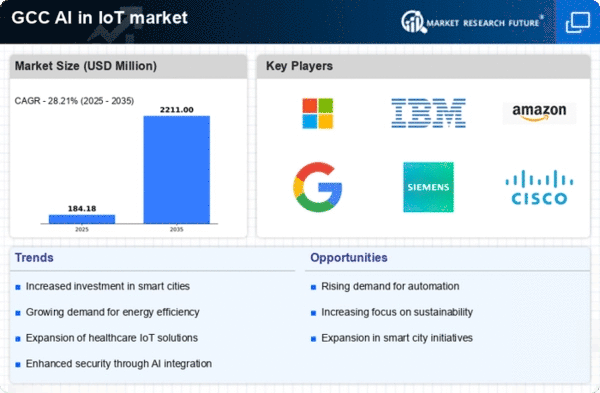Rising Demand for Automation
The AI in IoT market is experiencing a notable surge in demand for automation across various sectors in the GCC. Industries such as manufacturing, logistics, and healthcare are increasingly adopting automated solutions to enhance operational efficiency. This trend is driven by the need to reduce human error and improve productivity. According to recent estimates, the automation market in the GCC is projected to grow at a CAGR of approximately 15% over the next five years. As organizations seek to integrate AI capabilities into their IoT systems, the ai in-iot market is poised to benefit significantly from this shift towards automation, enabling smarter decision-making and streamlined processes.
Growing Cybersecurity Concerns
As the AI in IoT market expands, so do concerns regarding cybersecurity. The increasing interconnectivity of devices raises the risk of cyber threats, prompting organizations to prioritize security measures. In the GCC, the rise in cyberattacks has led to heightened awareness and investment in cybersecurity solutions. Companies are now seeking AI-driven security systems that can proactively detect and mitigate threats in real-time. Market analysis indicates that the cybersecurity market in the region is expected to grow by over 12% annually, reflecting the urgent need for robust security frameworks. This growing emphasis on cybersecurity is likely to shape the development of the ai in-iot market, as businesses strive to protect their data and infrastructure.
Government Initiatives and Support
Government initiatives in the GCC are playing a pivotal role in fostering the growth of the AI in IoT market. Various national strategies aim to promote digital transformation and innovation, with substantial investments allocated to smart city projects and IoT infrastructure. For instance, the UAE's Vision 2021 and Saudi Arabia's Vision 2030 emphasize the importance of technology in enhancing economic diversification. These initiatives are expected to drive the ai in-iot market forward, as public and private sectors collaborate to implement advanced technologies. The financial backing from governments is likely to create a conducive environment for startups and established companies alike, further propelling market growth.
Integration of AI with IoT Devices
The integration of AI with IoT devices is a key driver for the AI in IoT market, as it enhances the capabilities of connected devices. This integration allows for real-time data analysis, predictive maintenance, and improved user experiences. In the GCC, the proliferation of smart devices in sectors such as energy, transportation, and healthcare is indicative of this trend. Market data suggests that the number of connected devices in the region is expected to reach over 1 billion by 2026, creating vast opportunities for AI applications. As organizations increasingly recognize the value of AI-enhanced IoT solutions, the ai in-iot market is likely to witness accelerated growth.
Focus on Sustainability and Energy Efficiency
Sustainability and energy efficiency are becoming central themes in the GCC, influencing the AI in IoT market. As countries in the region strive to reduce their carbon footprints and promote sustainable practices, the demand for IoT solutions that optimize energy consumption is rising. AI technologies are instrumental in analyzing energy usage patterns and facilitating smarter resource management. Reports indicate that the adoption of AI-driven IoT solutions in energy management could lead to a reduction in energy costs by up to 20%. This focus on sustainability not only aligns with global trends but also positions the ai in-iot market as a critical player in the region's transition towards greener technologies.
















